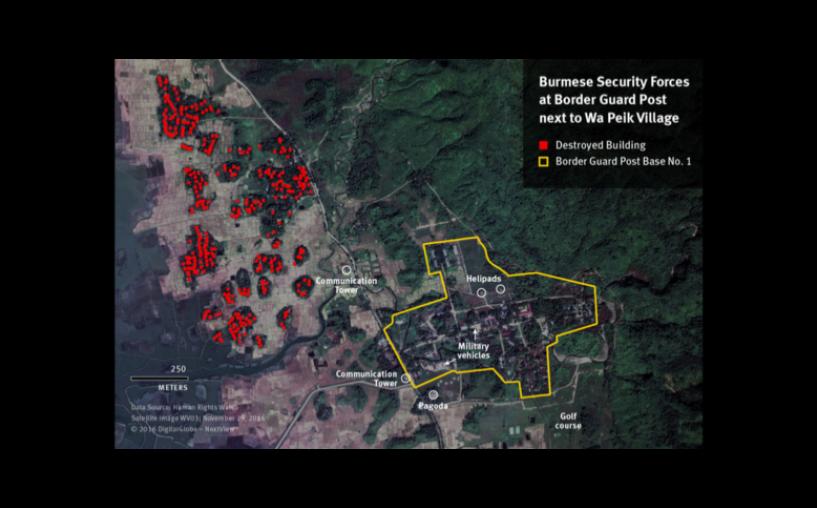HRW Satellite Images Nail the Burmese Lie: Army, Not Villagers, Burn Down Rohingya Villages

NEW DELHI: The new satellite imagery analysis of villages released by Human Rights Watch of the Rohingya village of Wa Peik in Rakhine province reveals four new elements.
One, the total number of destroyed buildings identified by Human Rights Watch has climbed to 1,500 as of November 23.
Two, the pattern of burnings over time suggests government responsibility for the destruction.
Three, Human Rights Watch documented systematic building destruction in villages on three occasions after government forces reportedly came under attack in the area, suggesting a reprisal element to the arson. In some cases, the fires started hours after a reported attack and in other cases a day or two later.
Four, the imagery reveals the presence of Burmese security forces in the Border Guard Post Number 1 that is located directly adjacent to Wa Peik village, which was almost entirely burned down in three waves over a one-month period.
"The new findings refute the Burmese military and government's claims that Rohingya militants were responsible for burning down their own villages," said Brad Adams, Asia director at Human Rights Watch.
In response to growing international and regional concerns, the government has now established a commission led by Vice-President Myint Swe, a former military general to investigate the attacks and allegations against the military but with the area presently under military curfew, and access to the region blocked to aid agencies and independent journalists, HRW has called for the United Nations to assist in the probe as it says the commission's composition and mandate raise serious doubts that it will conduct a thorough and impartial investigation.
This is the third Human Rights Watch report on the current crisis and the burning of Rohingya villages. On previous occasions the government denied that soldiers were to blame, saying the Rohingya has been setting fire to their own homes to attract international sympathy.
This increased violence on Rohingyas in the last three months has sparked international criticism of Suu Kyi's National League for Democracy government in fact many have criticised the Nobel Peace Prize recipient for her failure to end alleged military crimes in the country's northwest.
The United Nations has also called on Burma’s de facto leader to intervene and halt the military campaign against the long-persecuted Muslim ethnic group.
Kofi Annan, the former United Nations secretary general who currently leads a Myanmar government commission said it is "plunging the state into renewed instability."
United Nations envoy Zainab Hawa Bangura has also expressed grave concern over allegations of rape and sexual assault of women and girls in Rakhine as part of a "wider pattern of ethnically motivated violence" in the region.
Malaysia's prime minister last week said Aung San Suu Kyi must step in to prevent the "genocide" of Rohingya Muslims in Myanmar.
Contrary to her image of being the champion of democracy and human rights Aung San Suu Kyi accused the international community of stoking resentment between Buddhists and Muslims in the country’s northwest, while speaking to Channel News Asia last week.
However many observers sympathetic to the leader still point to the fact that the military is in charge of the security forces, and she has limited control over their actions. They also believe that she is not as popular in Rakhine as she is in the rest of the country, making it more difficult to create allies on the ground.
These ongoing military operations in Rakhine province since October 9 have had a major impact on the affected population. About 30,000 people have been displaced but the military and government have prevented humanitarian agencies from verifying the numbers or determining these persons’ needs.
(Cover Photograph: HRW Image)



